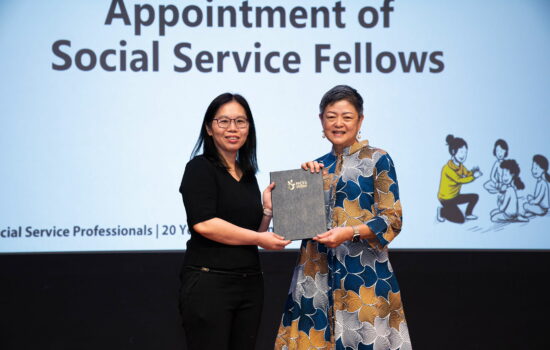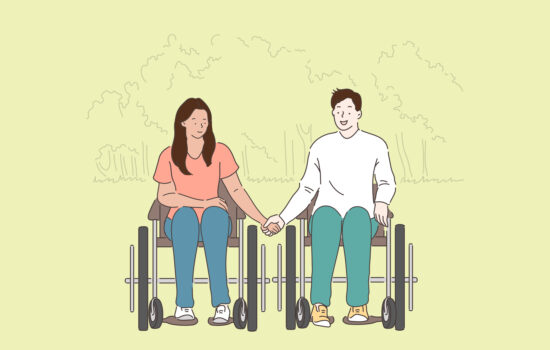Clemaus Lim, senior manager of the Community & Social Service Department which runs the Specialised Case Management Programme (SCMP), sheds light on the stress that caregivers feel resulting from taking care of their charges, and strategies that can help them cope better.
Caregivers are an “informal network of people, who step up as the first line of support to take care of those who need extra attention, such as people with chronic illnesses and those with disabilities. They are usually an unpaid individual, eg. spouse, partner, family member, friend or a neighbour involved in assisting others with activities of daily living and/or medical tasks”.
In Singapore, due to the shrinking family size and the ageing population, the role of caregivers is becoming more and more burdensome and difficult to manage. According to Basu (2013), it is estimated that 210,000 people aged 18 to 69 provide regular care to family and friends, and this number is expected to rise .
Caregivers usually have to navigate their way around a complex maze of assistance and aid and act as the main care co-ordinators tying together the fragmented pieces of care across several touch points including doctors from the clinics and hospital staff such as medical social workers, medical professionals, and therapists, and multiple social service agencies.
Caregivers usually take on multiple roles. It is no wonder that they usually experience not only role strain but role conflict as well. Role refers to how a person performs in a particular status or social position. Role strain, for example, occurs when a caregiver has to balance between caring for the PWD adequately and at the same time, not creating dependency in the care recipient. Role conflict often occurs because the caregivers are playing multiple roles, eg. they are a spouse, parent, sibling, breadwinner, while taking on the role of the caregiver at the same time. When these roles have conflicting demands and expectations, role conflict occurs and results in stress. Role overload may then occur when the caregiver is overwhelmed by the demands put on him/her as the caregiver.
Case example
Mr and Mrs Tan have three children and their youngest son Melvin (not his real name) has muscular dystrophy. Melvin is currently 19 years old and studying in a polytechnic. Melvin is totally dependent on Mrs Tan for his activities of daily living (ADL) and as such, Mrs Tan barely has time for her two other sons and husband, let alone herself. Besides having to look after Melvin, Mrs Tan needs to cook and do household chores for the family. Furthermore, she also needs to make sure that her two other sons’ needs are not neglected. The demands placed on her as a mother, wife, daughter, daughter-in-law has been extremely stressful to her. As a result, Mrs Tan constantly feels emotionally and physically exhausted. She also doesn’t have many friends or other social support system which makes her feels very lonely in this care journey.
Telltale Signs
Here are some telltale signs that a caregiver might be experiencing role overload and caregiver stress:
i) An increased sense of isolation and activity restrictions – the caregiver’s whole world revolves around the care recipients and thus, he does not engage in social activities nor have any social support;
ii) A sense of fear and helplessness, confusion and loss – the caregiver is constantly worried, fearful and helpless about what to do, resulting in a decreased sense of personal mastery and self-efficacy;
iii) Lack of rest (physically and psychologically) – resulting in sleep disruptions and fatigue;
iv) Inability to trust or lack of trust – increase in use of avoidance coping techniques and also heightened experience of depressive symptoms.
Build a Healthy Social Support System
There is no easy solution to manage caregiver stress because it is an extremely arduous task with its myriad responsibilities. Our suggestion is for caregivers to learn to exercise self-care through maintaining and building a healthy social support system. Talk to supportive relatives or friends, set aside time to unwind by engaging in enjoyable and therapeutic activities such as reading, listening to music, writing a journal on the caregiving journey, taking a walk in the park or catching a movie at nearby neighborhood shopping malls. Caregivers should also set up an exercise routine to maintain their health so that they can be healthy (both physically and mentally). They should also understand their limitations and learn to be realistic about what they can do to help their dependants.
Develop Confidence through Training
In addition, it is important for caregivers to develop greater self-efficacy and personal mastery such as attending training courses in behavioural and cognitive strategies to cope with stresses, eg. Problem-solving and stress management workshops, relaxation techniques and assertiveness training and learning how to increase the number of pleasurable events life.
SPD’s Specialised Case Management Programme (SCMP) offers caregivers and respite training through group work and psychoeducational workshops to help caregivers in distress. This is in addition to the case management services provided by our social workers and case management officers.
Through the caregivers and respite training, we hope to encourage caregivers to share their personal journey, such as tips on how they manage to balance their caregiving and other roles. We also hope that through the group work, behavioural and cognitive strategies can be imparted to increase caregivers’ efficacy and personal mastery. In addition, we also aim to form a support network among the caregivers so that they can be a support network for one another.
In Mrs Tan’s case, SPD’s social worker has been providing case management support. SCMP hopes that through the caregivers and respite training Mrs Tan will have a stronger social support, know that she is not alone in her care journey, and be provided with useful and concrete tips on how to manage stress effectively.
You Are Not Alone
The role of a caregiver is undeniably demanding and at times, terribly stressful. However, it can also be a rewarding and extremely satisfying experience. Caregivers are not, and should not be, alone in the struggle to provide care for their dependents. This journey is never meant to be a one-man show, but rather one of co-operation and commitment. On this note, let’s salute our caregivers and lend our support to them.
E-mail us for more information on the support the SCMP gives to caregivers.
Who Cares? Transforming the caregiving experience in Singapore, published by NCSS & fuelfor, 2016
Basu R., Singapore’s Caregiver crunch, Straits Times (27 Sept 2013).
Reference:
C.S. Anehensel, Social Stress: Theory & Research, Annual Review of Sociology, Vol 18, 1992, p15-38.





